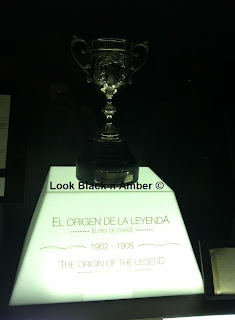You can read about part one, here.
Also on the tour, there was an opportunity to visit the
trophy rooms, as well as learn more about the history of club. From entering
the museum, there was a slight air of self-importance – a board en route
displayed the heading “the best track record in the world” with regards to both
the football and basketball team. If that wasn’t bad enough, the trophy room
itself was titled the “best club ever room”. Best seemed to be a recurring
theme and a superlative they often referred to themselves as.
The room itself was impressive with plenty of things to
look at (and the information was printed in English as well as Spanish).
Interactive screens were down one side, with options to research former
managers and squads; you could also relive goals and moments from La Liga
campaigns, Champions League finals and much more. The near side was strictly
memorabilia, each presented with a caption – very interesting.
An illuminated screen displayed the history of the club’s
crest and from a historic point of view and there were plenty of items from the
early 1900s, including old-fashioned balls, boots and shirts. Trophies lined up
in chronological order, grouped together based on competition – some of which I
had never even heard of and most likely were no longer existent.
The “best players of the world” was another display
dedicated to former and current Los Blancos’ stars, whom had won a number of
awards including the golden ball and golden boot. Ronaldo was a name that
featured prominently, with both the Brazilian and his Portuguese namesake
dominating the board. While this was interesting to read, it was another
example of the club showing off their achievements, which after a while, seemed
like arrogance.
The tribute to Alfredo Di Stefano also interested me and
his various trophies and personal possessions were donated to the Real Madrid
foundation’s heritage centre for the museum. Again, there were HD screens with
clips on display, showing some of his greatest achievements. The interactive
elements throughout made it a lot more visual and gave you the opportunity to
delve more into his life.
I wish I had taken more photos inside the museum,
particularly as some of the trophies were odd-looking and clearly archaic. The
newer elements appealed to me a lot more, as someone who doesn’t really have an
interest in the club. There was a glass cabinet with the current squad’s boots
(and in the case of the goalkeepers, their gloves), but my favourite was the
hall of fame. Down one of the corridors were lit up screens with snapshots of
every player to have donned the famous white kit – it was quite funny spotting
some of the more awful players (Thomas Gravesen) along with a few of my
favourites (eye candy purposes of course: Beckham, Kaka...), but the room was
quite bright.
In all, it was a lovely few hours, particularly as we
were allowed to walk around at our own pace. Even though I had been before, I
was still looking forward to going and if anything, it was better than my last
recollection. Tickets were €19, which is reasonable considering you could spend
hours there and there was plenty to see. It’s also really easy to get there,
once you’ve mastered the Spanish Metro system (which isn’t exactly difficult),
so it’s something I thoroughly recommend visiting if you’re in Madrid!









Hi, Lucy. I’m back! I guess, I just can’t get over the fact that you visited Real Madrid’s home stadium. I’m a die-hard Madridista, and stepping to Santiago Bernabeu is my ultimate dream in life. I know that it was a sensational experience. You’ve seen their signed jerseys, their classic boots, and outstanding trophies. I would be extremely happy if I get to have that chance too!
ReplyDeleteLinnie Dimmitt @ Uniforms Express